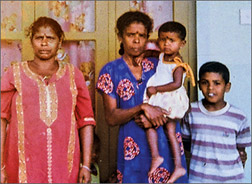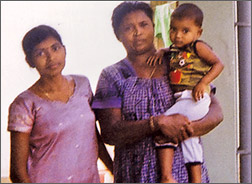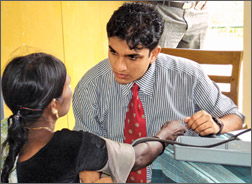|
Work on Upper Kotmale tunnel completed:
Resettled families fully contented
By P. Krishnaswamy
|

The Nanu Oya Resettlement scheme
|
The arduous task of the 13km headrace tunnel of the Japanese-funded
US $ 334 mn Upper Kotmale Hydropower Project (UKHP) having successfully
completed and the project to be ready next year to add 150 MW power to
the national grid, the Sunday Observer last week visited the
rehabilitation sites of families that were displaced and relocated under
the project for an on-the-spot study of their life in the new
environment.
A majority of the 495 displaced families belong to the plantation
community. Of them 430 families have already been relocated in nine
resettlement sites while the remaining 65 families are to be relocated
in the project site after reclamation of land and construction of
housing units.
Except for a few cases, a majority of the affected houses were small
and lacked basic facilities, such as electricity, safe drinking water
and access roads. Sanitation levels were extremely poor. About 44
percent of the affected houses were with a floor area of less than 300
sqft. A majority of them were occupants of line-room houses provided by
the tea estate managements. The policy of the project is to provide
house for house, alternative buildings for affected commercial
establishments and relocation of affected common amenities. The ADB
guidelines on resettlement and the National Involuntary Resettlement (NIRP),
adopted by the Government in 2001, emphasize that the livelihood of the
affected people should be restored at least to the pre-project level.
The UKHP has been extremely mindful in that aspect and devised a
scheme not just to restore the livelihood but also to enhance the income
of each affected families, project authorities said.
It was pouring rain when we reached the Rathneelakelle Housing
settlement, comprising 117 housing units, about two km from the
Talawakelle town. A majority of the occupants of this settlement were
formerly residents of Rathneelakelle Division of Holyrood Estate,
Talawakelle and many of them still continue as workers in that estate.
This housing settlement is a model of religious and ethnic harmony with
all religious and ethnic communities living together side-by-side as one
big family. We selected at random the housing units to visit and
interviewed the occupants.
|

The bridge constructed over the Kotmale Oya in Talawakelle town.
The B 4 1 Road was renovated and carpeted |
The members of families who were at home when we visited expressed
contentment about their new housing units, the amenities available to
them, the environment and the neighbourhood. The housing units in this
settlement come under ‘A’Grade and consist of two bed rooms, a hall,
kitchen, bathroom and commode toilet.
We first met the family of Dharmalingam Sathisraj (37), his wife and
their three children. Their 16-year-old son is not attending school
while the two daughters younger to him are attending the Talawakelle
Tamil Maha Vidyalayam. They said that the facilities that they are
enjoying in the new house are much better than what were available to
them in their former estate line-room quarters, Sathisraj said.
Bus services
He said that the only shortcoming was want of enough bus services.
Presently bus services are operated by the Ceylon Workers’ Congress (CWC)
every four hours using buses donated by the Government of India and
there are no other transport services available to them. His wife is
working on the estate while he is working as a carpenter in Talawakelle
town.
He was paid a compensation for the small plot of vegetable garden
which he had lost under the project. They had bought TV and radio sets
after coming to occupation of their present house in the settlement.
Life is much peaceful and happier than what it was in the estate
quarters, Sathisraj said.
The family of Murugan Kandalingam (54) and his wife Pushpadevi (44)
said that their two daughters and one son are married and living in
other estates.
They reared goats in their former living quarters in the estate and
the UKHP authorities have promised to provide them with the same
facilities, Kandalingam said. They said they are very happy in the new
house and its environment. They expressed the minor shortcoming that
light bulbs in their house is getting fused oftener than usual and it
may be due to the close proximity of their house to a transformer.
The family of Thomas Solomon (45) and his wife Vasukidevi (42) who
are living with their son, daughter-in-law and an unmarried daughter
also expressed similar sentiments with regard to their new house,
facilities available and the neighbourhood.
 |

Families who were interviewed at the Rathneelakelle Settlement
site |

The earlier dwelling |

A doctor examins a patient |
They were compensated by the UKHP authorities for the vegetable
garden they had lost and they bought TV and Radio sets, they said.
Sandanam Kitnamma (44), a widow, is living with her son Sasikumar (25),
daughter-in-law Selvamani (23) and younger son Radhakrishnan (20). She
worked on the estate and retired. Her younger son is still working on
the estate. The sentiments they expressed about their new house and
facilities are same as what the others expressed. The family Abdul
Latiff (41) and Perumal Kamaladevi (37) who have three children aged 18,
11 and four had similar sentiments to express. They said that they were
paid Rs.26,800 as compensation for the vegetable plot which they had
lost.
The family of Sandanam Mariadas (59) and Daniel Mary (54) living with
their daughters Ranika (30), Arul Mary (24) and Fatima (20) and son
Iruthayaraj (19) said that only their last son is now working as
labourer on the estate. Since they are now in the UKHP quarters they
have their freedom to decide where to work and there is no compulsion on
them to work on the estate.
Mariadas is working in a eating house in Colombo. One daughter is
working as a house maid in Colombo. The project authorities have already
built a church for the catholic community and a priest comes from
Colombo every month to conduct services, they said.
Sivalingam Chandramohan (27) is living with his unmarried sister. His
single mother died four years ago. She worked on the estate as a
labourer. He is working as a carpenter in Talawakelle town. Anandapillai
Ramayee, a 56 year old widow, said that her husband and she worked on
the estate. All their five children are married and living elsewhere.
She was paid Rs.24,000 as compensation for the vegetable garden which
she lost under the project.
Resettled families
The family of M.R. Wijeyawardena ( 39) married to Rizmia (32) living
with their two daughters aged 14 and 12 and son aged eight said they
were living in the Talawakelle town which came under the project.
The family of Mohamed Farook (69) and Siththi Haleema Beebee (64) and
the family of M.R. Wijeratne (40) and Anoma Chandrakanthi (37) also
lived in the part of the Talawakelle town that came under the project.
Sandana Mary (42) is living with her mother and two children. She is
still working on the Talawakelle Estate as a labourer.
Her husband is working in Colombo as a domestic servant. All these
families said that they are happy in their new house, new environment
and they have nothing to complain about.
These independent housing units built in the lush hills of the
project site are unique and picturesque and resemble the cottage type
housing settlements in some European cities, especially England,
although they are comparatively smaller in size. Every house has access
road, electricity, pipe-borne water and other amenities which the
families did not have before.
All the houses, common amenities and other structures, such as cattle
sheds, have been relocated with larger floor area and better facilities.
Motorable roads, electricity and pipe-borne water have been provided to
the relocated families. Adequate compensation has been paid to some of
the families who have lost their vegetable plots.
New locations have been selected in consultation with the affected
communities. It has been ensured that the maximum distance to their
workplace from their new locations is 1.2 kms but a majority of the
working members of the families have to travel only an average distance
of 100 metres to their workplaces.
The UKHP considered it would be highly productive to empower the
affected people by developing their occupational skills which will
generate long-term results. With this objective in mind, the UKHP
conducted several Occupational Skills Development (OSD) Training
programs for the benefit of the youth from the affected families. Under
the OSD Training Program of the project, field training to youths on
Heavy Equipment Maintenance participated by 13, Electric Welding
participated by 15, Electric Wiring participated by 15, Plumbing by 10,
Dress Making by 15, Advanced Course in Dress Making participated by 27,
Mushroom Cultivation participated by 15 and Computer Training by 20 were
conducted at the relevant training institutes in Battaramulla, Nuwara
Eliya, Hatton, Gannoruwa and Talawakelle.
Around 160 families have been resettled in the Talawakelle Division
housing settlement, 117 families in the Rathneelakelle settlement, 61
families in Kumaragama settlement, 28 families in Walkers’ Place
settlement, 39 families in UC settlement, 20 families in Dewsiripura
settlement, 25 families in Middle Bazaar settlement, 17 in Middletown
Division settlement and 21 families in Nanuoya Division settlement. In
addition eight families of CGR officials have been relocated in eight
compartments and four quarters have been provided for veterinary
officials, according to Assistant Rehabilitation Officer of the project
Velu Chandrasekaran. The resettlement of the families were done under
the meticulously devised Resettlement Action Plan (RAP), taking into
consideration the magnitude of the social impacts, restoration and
improvement of the living standard of the families, enhancement of
income earning capacity, increasing levels of production and also
uplifting their general well-being, project authorities said.
Occupational skills
This is the first time that so many programs were introduced for the
socio-economic well-being of families getting resettled, official
sources commented. Occupational Skills Development Programs were
launched even before laying the foundation stones for the housing
projects, the sources said.
The UKHP from the very beginning encouraged wider participation of
the affected people and other stakeholders in the implementation of the
Resettlement Action Plan (RAP) from the preparation stage, officials
said. For this purpose an extensive consultation program was carried out
to create awareness of the benefits of the project to the country as a
whole and the entitlements of the affected people. Housing Committees
for each affected community were set up long before the actual
implementation of the project. Housing Committee meetings are held every
month to discuss the resettlement implementation.
The dialogues between the affected households and the officials of
the UKHP at these meetings were extremely fruitful.
Wider participation in the implementation of the RAP was encouraged
by establishing a Resettlement Committee. The Resettlement Committee
comprises the Divisional Secretary (co-chairperson), Chairman,
Talawakelle-Lindula UC (co-chairperson), religious dignitaries of the
project area, council members of the UC, two representatives from each
Housing Committee, Grama Niladharis of the area and officials of the
UKHP. Meetings of the Resettlement Committee are held every two months
and broader issues are discussed at the meetings.
There are six categories of houses in the project - A, B, C, D. E and
F Grades - each slightly different from the others and have been handed
over to families on the basis of the nature of houses which they
occupied prior to their relocation.
Income Enhancement Programs for the affected families include OSD
training programs, micro financing schemes and home garden programs.
Pears, mandarin and apple plants have been distributed among the
resettled families under the home garden program.
The Social Development Program which includes women and child
development is also being implemented. |

